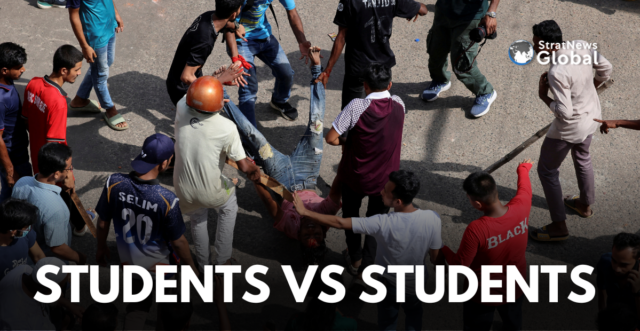Bangladesh’s seemingly monolithic student movement that brought down Sheikh Hasina last August, is showing signs of division.
The Dhaka Tribune reports that on Thursday, students at the Khulna University of Engineering and Technology (KUET) held a “red card” demonstration on campus against student political organisations. They said there should be no politics at their university and only student agendas should be open for discussion.
Although Khulna University does not allow student politics, there is concern that the courts could step in and allow political parties to send their student wings into the university.
Other reports said that Tuesday’s violence at Khulna University involved the BNP’s youth wing the JCD, that tried to recruit students and got into an altercation with the Students Against Discrimination (SAD), which had spearheaded the anti-Hasina protests.
Videos of students wielding scythes and machetes against fellow students, and many of them being rushed to hospital bleeding and injured, have been widely circulated on social media.
The violence underscored a point, the students have not yet been able to organise themselves into a durable political force despite their presence in the interim administration of Mohammad Yunus.
Although Yunus has said that “election dates could be fixed by the end of 2025 or the first half of 2026,” and is insisting on “reforms” that include a “flawless voters list”, the discord in student ranks suggests the time frame for elections may only be to the advantage of the established student wings of political parties like the BNP.
The SAD is expected to announce its leadership line up on Monday, with speculation centering on a student-led political party that could transform the political landscape. One will have to wait until then to figure out what the SAD has in mind to take national politics out of the current morass.
Will the ideas and programmes be radical enough to galvanise students all over the country and unite them? SAD clearly hopes so.
Thirty eight years in journalism, widely travelled, history buff with a preference for Old Monk Rum. Current interest/focus spans China, Technology and Trade. Recent reads: Steven Colls Directorate S and Alexander Frater's Chasing the Monsoon. Netflix/Prime video junkie. Loves animal videos on Facebook. Reluctant tweeter.





